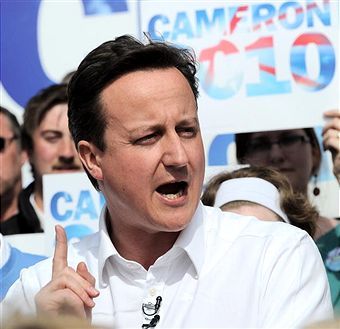 Europe is likely to play a big role in tonight’s debate. It is probably the one
issue that divides the Liberal Democrats and the Tories as much as electoral reform. Nick Clegg, a former MEP and adviser to then-EU Commissioner Leon Brittan, is a euro-enthusiast who would like
Britain to join the Euro, even if it takes time. David Cameron is a euro-skeptic (though not, to the chagrin of many CoffeHouse readers, obsessed about the issue).
Europe is likely to play a big role in tonight’s debate. It is probably the one
issue that divides the Liberal Democrats and the Tories as much as electoral reform. Nick Clegg, a former MEP and adviser to then-EU Commissioner Leon Brittan, is a euro-enthusiast who would like
Britain to join the Euro, even if it takes time. David Cameron is a euro-skeptic (though not, to the chagrin of many CoffeHouse readers, obsessed about the issue).
But neither wants a confrontation with the EU and other European governments over the next four years – and the Liberal Democrats have become quieter over time about their pro-EU tendencies. Their support for Labour’s avoidance of a referendum on the Lisbon Treaty is not proving particularly popular on the proverbial doorstep – and they know it. So the issue, to quote Fraser Nelson, “may not be a deal-breaker”.
If Nick Clegg becomes Foreign Secretary, as some have suggested, and promises to keep schtum about the Euro, then this could work. It would certainly be in Europe’s interest not to provoke a clash with Britain, which would tear the coalition asunder. But that could also be the genius of the pact – Clegg would be telling Nicolas Sarkozy and Angela Merkel to be nice to Britain lest that madcap prime minister he has to deal with reneges on the Con-Lib coalition deal and makes matters much worse (by potentially winning an election on “Who Defends Britain”). As a result, European leaders are likely to give a Clegg-Cameron government an easier time – to the benefit of both parties.
For Prime Minister Cameron, having Clegg in King Charles Street may also suit him nicely – allowing the Tory leader to focus on Britain’s economy, upon which elections will be won, not EU issues, which bore the population. He will likely face an internal revolt by the diehards, no doubt egged on by CoffeeHouse regulars, but he will survive. By then, the party will be in power, which tends to concentrate the minds of rebellious MPs hoping to finally get their hand on those ministerial boxes.
The only thing left to be resolved is that small matter of Clegg’s quixotic call for an EU referendum. I say quixotic because rarely has a politician called for something he believes less in. Any “in-or-out” referendum is likely to lead to Britain’s departure form the EU. In the short-term, Clegg is pitching the Lib Dems as the only major party who would give voters the chance to vote to leave the EU and uses the language to get around the Lisbon issues. But he would curse the day such a referendum was agreed – and I don’t see anti-EU voters trusting his party.
His get-out-of-jail” card is that a referendum would only be triggered if a new treaty was proposed. The Lib Dem leader is probably calculating, correctly in my view, that there will be no new EU treaties for another decade or more (excluding the amendment of treaties to allow for the EU’s enlargement, as even the proposed Sovereignty Bill will probably give parliament the right to decide on this). But who knows. Stranger things have happened. Nick Clegg may regret the day he played fast-and-loose with his EU policy.






Comments